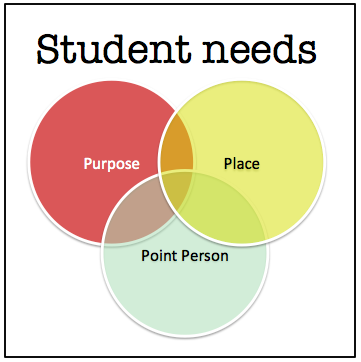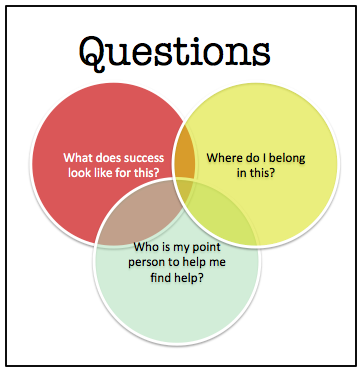This year I want to focus on resilience.
In my day job, I’ve been working with or around transitions to university for 8 or 9 years now. At UPEI, we’ve developed and tried out a number of projects in that time, including program specific transitions courses, a couple of MOOCs (The 2013 Facebook edition is still live) – lots of good work done that we’re proud of. This is my second full year responsible for New Student Orientation and through conversations with students, teachers, faculty, counsellors, lots of staff – even PEI’s Minister of Education – we’ve pretty much come to the conclusion that resilience is the approach we want to take to supporting transitions this year. How can we help students continue to feel like they belong when they face adversity? How do we support and model resilience from day 1?
What resilience isn’t
I am not talking about the kind of resilience that is touted by arch-conservatives as the way people used to be ‘in their day’. I am not suggesting that students have gotten soft, that they need to harden, or that somehow we, as an institution, are responsible for being the crucible through which we mint ourselves some toughened students. That’s hazing and it’s gatekeeping.
I am also not talking about the kind of resilience warned of by Viv Rolfe in which she worries that we encourage resilience instead of making our spaces better places to thrive.
What we mean by resilience
Rolfe suggests “A better way of thinking should be to consider resilience as a process and not a personality trait.” It is this process that we are seeking to model and embody in our orientation this year. The current state of our conversation is that resilience for us involves working on goal setting (both micro and macro), creating a sense of place for students to belong, and having point people available to help students find the help they need.
One the one hand, students need to be able to understand their role, work towards understanding their own goals, finding places and people to work with and learn from. We, as an institution, need to be a place where they can work towards their goals, where a sense of place is available to them and where we encourage others – students, staff and faculty – to be the point person for people to learn from and through which they can find help…even when paths to help are complex or not directly visible.

So this is our first draft at what that looks like as an initial model for what we’re hoping new UPEI students – and the rest of us, maybe – will learn at NSO.
Responsibility as a campus
I think of the goal setting part of this, the ‘purpose,’ as tricky business for a campus. My sense of the strength of higher education is in the diversity of ways students encounter goal setting… and the multiplicity of ways in which success can be viewed. I’d like to encourage people to talk about this to students and to work with them, but would certainly not want to be prescriptive.
As someone who’s been thinking about community in education… obviously a sense of place is something that is important to me. We have the infrastructure in place to provide that sense of place, both on and off campus, but we need to come up with ways to offer people ways of belonging from day 1. We’re working on this. Not everybody wants to belong in the same ways, so again, this can’t be prescriptive and needs to remain in Snowden’s complex domain.
For the ‘point person’ idea to work, we need to be transparent about who can help whom and for what. If we see our student volunteers as the primary point person for new students, we need to be very clear with our them about how they can help students get help. The idea is to scaffold new students into the systems and networks of the institution, not just pass them along the channels of the institutional hierarchy. This will require point people – and the point people’s point people all along the line – to act as identities with connections and individual knowledge, not just within the bounds of their roles. Work to do here… but we have some plans in place.
Responsibility of our student volunteers
I can’t really say enough about the volunteers we have in place for orientation. At last count we have 102 volunteers who have committed their time to helping make the transition to UPEI a valuable experience for everyone. The trick here, I think, is for these students to become comfortable with using the model themselves. They need to understand it, understand their own strengths and weaknesses with it, and refer to it during the whole planning process.
We also need to be clear about what we mean by encouraging them to be ‘point people’. A point person is someone who is just ahead of you, someone who can point you in the right direction if you need help or guidance. That person can share their own experience… but are NOT a professional who should be offering advice in critical points of struggle. We’re going to need to work towards that.
The responsibility of the new student
Obviously a pile of responsibility lies with the student as well. They need to struggle towards understanding their goals. They need to work to belong to spaces that are valuable to them. They need to find key point people and use them effectively. BUT… and this is a big but, they can’t be expected to know that before they come. I do not believe that students are under any cultural imperative to understand what they need to do before they come. It’s our job to work with them to help them get there.

We’re hoping that we can grow this model into something that can help us grow towards a campus that supports resilient students. Would love your feedback on our first draft.
Nice work Dave. Pleased you said what resilience isn’t and pointed to the risks outlined by Rolfe. My fave line is “I do not believe that students are under any cultural imperative to understand what they need to do before they come. It’s our job to work with them to help them get there.” Please keep posting on progress – I shall follow with interest.
Nice article Dave. What you are talking about is student transition into a new learning environment which is hugely important. I totally agree we should nurture and support that in the first year of study. My concern was with mental resilience and the way it is being miscommunicated in the UK HigherEd sector with the emphasis on people ‘bouncing back’ rather than addressing underlying causes.
Thanks Viv, I found your article to be very helpful in framing what we are trying to do. I am a little worried about the word resilience because of the baggage it is acquiring, but it still seems to resonate with the people i’m working with here.
Cool. Have you come across Helen Beetham’s work on digital well being? https://www.jisc.ac.uk/blog/thriving-in-a-connected-age-digital-capability-and-digital-wellbeing-25-jun-2015
Yes – words are all important, and there might be additional ‘across the pond’ variation also I guess.